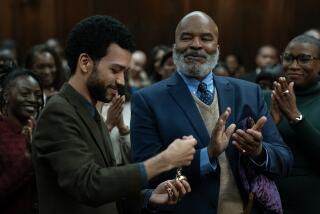Indie Focus: ‘Night Catches Us’ examines the Black Panthers circa 1976
Recent films such as “Carlos,” “The Baader Meinhof Complex” and “Che” have looked at the blowback and aftermath of the revolutionary adventures of the 1960s and ‘70s across Europe and South America. With “Night Catches Us” writer-director Tanya Hamilton brings some of those same passions and upheavals to domestic shores with a look at the personal undercurrents that drive the political actions in one neighborhood in Philadelphia in 1976.
Hamilton’s film, opening in Los Angeles on Dec. 10 and available on video-on-demand, is a fictional drama but has some rough basis in historical truth. The film covers the story of a one-time member of the Black Panther Party (played by “The Hurt Locker”’s Anthony Mackie) returning to his old neighborhood to rekindle a long dormant relationship with a fellow activist ( Kerry Washington, most recently seen in “For Colored Girls”). While the story isn’t based on any specific person, in her re-creation of the times and its conflicts, Hamilton was careful that the scenario, which plays out as something of an elegiac romance, remained plausibly grounded in the realities of those who lived through the era.
“To me, the Panthers have not been allowed to be humanized,” Hamilton said by phone from Philadelphia, where she lives. “We didn’t want the movie to be about sexy black men with guns. We wanted to make a movie about people who had complexity, who were struggling and flawed. I didn’t want to make a movie that was about teaching, I wanted to make a movie that was complicated.”
The Black Panther Party, which first emerged from Oakland in 1966, remains a divisive piece of American history. The group’s 1966 Ten-Point Program (with the subtitle “What We Want, What We Believe”) touches on healthcare, education reform, housing and employment issues that are still startlingly relevant today. Yet the Panthers’ graphic iconography — the leather jackets, the berets and especially the guns — alongside sometimes violent run-ins with law enforcement have often overwhelmed discussion of their core beliefs. While some fiction films, perhaps most notably Mario Van Peebles’ 1995 “Panther,” have depicted the rise of the Panthers, they have mostly been seen on film through documentaries, mostly focused on their early years.
“There’s something extremely interesting and tragic and romantic about that section of African-American history,” said Hamilton of the period after the triumphs of the 1960s civil-rights era. “And it’s a piece of history that’s not looked at a lot.” Hamilton moved with her family to the U.S. from Jamaica in 1976 when she was 8. She heard stories of the Panthers as she grew up, and a friend of her mother had been a political activist. All those things came together in the process of writing the project, which took about 10 years to get from script to screen.
“Perhaps in some way I was looking for a connection to that time,” she added.
For Mackie, it was exactly the ways in which Hamilton’s script funneled the political issues of its setting through the human stories that resonated with him. “One of the things the script was able to do, something I was intrigued by, was showing the effect of the movement on a specific group of people,” he said. “For me the movie is about the future, how do you move on from the problems of today to transform them into a better tomorrow.”
“It’s a hard story to tell. The movement and the times were larger than life,” said Jamal Joseph. Chair of the graduate film department at Columbia University, Joseph joined the Black Panther Party at 15 and was part of the group of jailed members for whom Leonard Bernstein threw the infamous cocktail party fundraiser chronicled in Tom Wolfe’s “Radical Chic.”
Though Hamilton attended film school at Columbia, Joseph was never her teacher. He did advise her as she worked through the writing process on “Night Catches Us.” It was always balancing the larger story of the Black Panther Party and the specifics of her characters that was the biggest challenge for Hamilton.
While the film points to certain historical facts – such as the government-sponsored disinformation campaign against the Panthers – Hamilton was also careful that the political never overwhelm the personal.
“It’s easy for me to speak about it today with nothing much at stake, but I feel like there is such great complexity in the people who were part of the Panther movement and I feel like that complexity has been lost,” she said.
“The one thing I could do was to show that the party in its purest form, was a grassroots organization started by people who had a great commitment and connection to their community who really wanted to make a difference with their neighbors and kids. And like all political movements, things got complicated.”
More to Read
The biggest entertainment stories
Get our big stories about Hollywood, film, television, music, arts, culture and more right in your inbox as soon as they publish.
You may occasionally receive promotional content from the Los Angeles Times.







